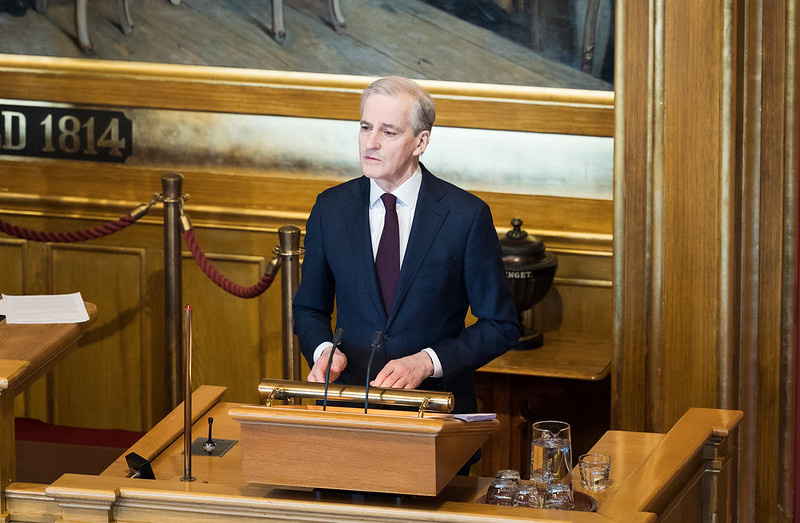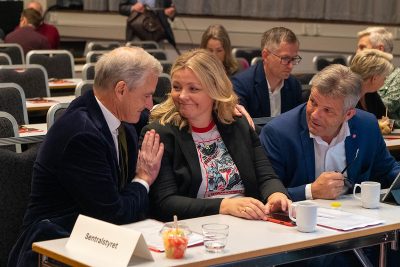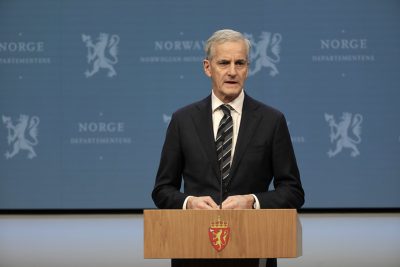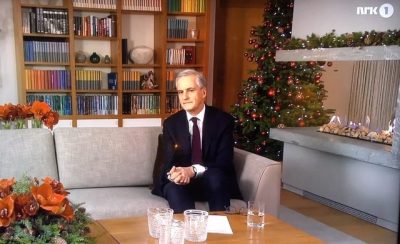Prime Minister Jonas Gahr Støre and his Labour-Center government had a rough first year in office and now they’ve slumped again in public opinion polls. They blame it on the constant crises confronting them, from the war in Ukraine to all its negative consequences, but voters seem to be questioning Støre’s judgment and why the “ordinary folks” targeted during the 2021 election campaign aren’t getting the relief promised.

A new poll, conducted by research firm Norstat for newspaper Aftenposten and state broadcaster NRK, shows Norway’s Labour Party with just 17.5 percent of the vote. That’s down nearly two points from Norstat’s last poll in early January. It also confirms another sharp decline from election results of 26.3 percent that allowed Støre to form his minority government with the Center Party. Center, meanwhile, holds just 5.4 percent of voter support in the new poll, compared to election results of 13.5 percent.
“The numbers aren’t good enough,” admits Labour’s party secretary Kjersti Stenseng. Hopes had risen just after New Year when Labour and Center performed better in local polls in early January, only to see them sink again while opposition parties rose across the board. Labour’s main rival, the Conservative Party, currently has support from 31 percent of voters polled and their former government partner, Progress, has 14.5 percent. They’d be able to form a majority government again with support from the Christian Democrats and Liberals.

Stenseng and Støre blame mostly pocketbook issues, like sharply rising prices, higher interest rates and the electricity bills that are still shocking Norwegians every month. “January has been tough for folks,” Stenseng told NRK on Thursday. “It’s natural that frustration and dissatisfaction are directed at those sitting in government and running things.”
Stenseng says the government and voters need “to be a bit patient at a time with many crises piling on top of one another. I also hope we will see results of the policies we’re delivering now, both regarding interest rates and price growth.”
Støre himself, however, has been widely viewed as fumbling on several key issues. As a highly educated former foreign minister proficient in several languages, and with a vast network of international connections, Støre seemed like the best person to lead the country when Russia invaded Ukraine nearly a year ago. He’s respected abroad and has been included in many of the top-level crisis meetings held by international leaders, an honour for a small if wealthy country like Norway that isn’t a member of the EU. Yet several Norwegian commentators complain Støre has been spending too much time traveling outside Norway and not enough in Norway.

Norwegian commentators have noted that Støre now seems better liked abroad than at home: A year after Russia launched its war against Ukraine, Støre’s government has also been criticized in Oslo for not providing enough aid to Ukraine, not being better prepared for war, and not sufficiently helping “ordinary folks” at home during a time of economic upheaval.
Both the Labour and Center parties had promised during their election campaigns that “now it was vanlige folks’ (ordinary people’s) turn” after eight years of Conservative rule. Støre’s government rolled out its first state budget last fall that openly aimed to redistribute income by raising taxes on the wealthy and lowering them for those earning less than NOK 750,000 (USD 75,000) a year. Many promises have since appeared to be broken, while the state is raking in record tax revenues both from its 25 percent VAT on everything from much more expensive food and electricity to all other goods and services. Other record revenues are pouring in from taxes on the oil and gas industry, and the state’s own oil revenues, yet budgets are tighter than in earlier years. Støre has wanted to save much more of Norway’s oil revenues for future generations, and less in his own state budget.

Even many Labour voters now think they’re being taxed too much, also on inflated values of their homes and other property, while public services and budgets are being cut. The government’s priorities are also under siege, especially after Norway was shaken in recent weeks by reports of serious staffing shortages at the country’s hospitals and nursing homes, and shocking examples of highly inadequate elder care at home. The “cradle to grave” security of the Norwegian social welfare state is now seriously in doubt, causing even more trouble for a Labour-led government.
Støre himself has also been criticized for being out of touch with the actual labour movement. His own family’s personal wealth and even his high-level education tend to place Støre among Norway’s elite, instead of the working class Labour traditionally serves. His judgment has been questioned, especially when he appointed a consultant from the secretive firm McKinsey to be his new state secretary, without seeming to realize that the public would want and need to know the identities of consultant Kristoffer Thoner’s former clients at McKinsey. The potential for conflicts of interest was high. It ended with McKinsey releasing a list of those with whom Thoner had worked only to the Office of the Prime Minister, not the public in general.
Both Støre and Labour’s party secretary Stenseng deny Labour is in crisis, or Støre himself. Even when polls dipped as low as 14.6 percent late last year, Støre gamely claimed he was willing to be unpopular in order to get the economy under control. He has claimed that while voters want quick solutions to the spikes in electricity rates and prices at the grocery store, no government could deliver them. He has fended off criticism of weak leadership and even went so far as to claim that Labour’s election slogan about “ordinary folks’ turn” was never his favorite.
He has also pointed out that many other governments in Europe are struggling to retain voter support, also within Scandinavia. “We must take it seriously that many voters are uncertain right now,” Støre told news bureau NTB in mid-January. “Many are sitting on the fence and want better answers from us.” That was interpreted by some as an acknowledgment that he’s been too vague.

Støre, also criticized for often being gloomy in his speeches, appeared remarkably relaxed during his New Year’s address to the nation, taped inside his residence and with a fire burning in the background. Some analysts described it as less political and delivered in a more direct manner, with a professor of rhetoric at the University of Bergen praising Støre for “a natural style that I found sympathetic.”
Støre’s predecessor and arch rival, Conservatives leader Erna Solberg, was often praised for her own casual style and is clearly waiting in the wings to take over if the opportunity arises. She agrees that Støre’s government “has met difficult times, but they have chosen to create more unease with their own politics,” she told NRK on Thursday after the new poll was released. Solberg, who led Norway through the Corona crisis, pointed to unhappiness over taxation, health care and schools.
“I think there are many areas where people think there was more uneasiness than necessary at a time of many challenges,” Solberg said. She’s happy her own party is nearly twice as big as Labour at present, and said her goal is to double the number of Conservative mayors in local elections this fall. The next national election will be held in the fall of 2025.
NewsinEnglish.no/Nina Berglund

